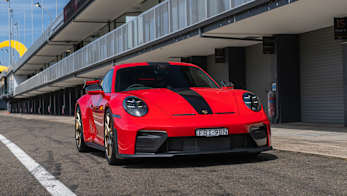Chery is the latest car brand to join the solid state battery party.
The Chinese brand said it is expected to fit the next-generation batteries to its cars from 2026.
It claims these new cells will give its electric cars up to 1500km of driving range on a single charge.
-
New Chinese Toyota HiLux challenger is a hybrid? First prototype images of Chery's incoming Ford Ranger, GWM Cannon and Isuzu D-Max ute rival show production is well underway and likely to arrive in Australia in 2025
-
Game changing electric car battery breakthrough shows China has won the EV battle: 2025 MG to feature solid state batteries years ahead of Toyota and Nissan
-
Is this the electric car battery breakthrough we've been waiting for? Game changing technology debuts in little known Chinese brand's new EV and it's coming to Australia to battle the Tesla Model Y, BYD Seal and Kia EV6
Chery currently only sells one electric car in Australia, the Omoda E5.
It uses a 61kWh battery that delivers a driving range of 430km with a max charge rate of just 80kW.
Solid state batteries are thought to be the silver bullet to mass electric car adoption and vital to achieve fully electric utes and four-wheel drives.
The futuristic batteries are smaller, lighter, more energy dense, quicker charging and safer than current cells.
This is achieved by using a solid electrolyte instead of a liquid or gel used in conventional units.
Chery announced the plans to install solid state batteries in its cars at this week's Chery Global Innovation Conference.

It will develop the batteries in-house via its new battery brand, Kunpeng.
The solid state cells will have an energy density of 400Wh/kg initially before upscaling to 600Wh/kg.
A lithium iron-phosphate (LFP) battery, which is used by BYD, has an energy density of up to about 160Wh/kg.
Chery used the conference to announce it will release a new series of ultra-fast charging LFP batteries immediately.
These are rated as 6C batteries. A 'C' rating is the speed a battery can charge: 1C means it can take one hour to replenish to full and a 2C rating takes 30 minutes, a 5C takes 12 minutes and a 10C takes six minutes.
Chery claims these batteries can add 400km of range in five minutes, but it is unlikely you’ll be able to find a charger powerful enough to add that much juice so quickly.

Chery is the latest in a long line of electric car brands to forge ahead with solid state batteries.
MG recently announced it would start adding the tech to its cars from next year.
Chinese brand GWM claimed to have developed a micro solid state battery earlier this year, but it still needed to be scaled up.
Nissan, Toyota and Volkswagen have been pressing hard to develop solid state batteries first, too.
MG’s announcement comes years ahead of rivals. Its parent company SAIC rolled out a semi-solid state battery in its IM Motors L6 sedan — however the latest update is an even bigger breakthrough.
Toyota has previously said to look out for 2027 for the first application of solid state batteries in a production vehicle, while Nissan is targeting 2028.













.jpg)

.jpg)
.jpg)


.jpg)

.jpg)






.jpg)
.jpg)
